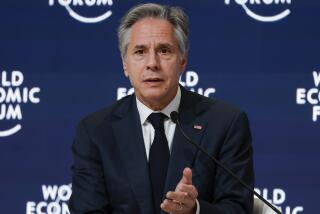Kerry travels to Afghanistan amid stalled security negotiations
- Share via
KABUL, Afghanistan — Secretary of State John F. Kerry made an urgent visit to Afghanistan on Friday to spur stalled negotiations on an agreement that would keep some U.S. forces in the country after the NATO mission concludes next year.
The Bilateral Security Agreement has been under negotiation for a year and both sides agreed in January the deal must be completed by the end of October. The lead time is needed to secure bases beyond 2014 and to draft deployment plans appropriate to the post-withdrawal responsibilities, officials have said.
The deal that might keep as many as 10,000 U.S. troops in Afghanistan is stuck on the contentious issue of how much latitude the foreign forces would have in pursuing terrorist suspects in the country. Kabul has demanded written assurances that U.S. troops will defend Afghanistan if it is invaded, a military commitment that would require the Obama administration to get the approval of a divided Congress.
Two senior State Department officials traveling with Kerry briefed reporters on board his plane as it headed for Kabul, a transcript of which was made available by the department.
“In any negotiation with any country where there are tough issues, the sticking points almost always, if not always, come down to the end, and that’s the point we’re at now,” one of the diplomats said, describing the security pact as 95% finished.
The visit to Kabul was agreed upon in an Oct. 5 phone call between Kerry and Afghan President Hamid Karzai, the officials said, in hope of breaking an impasse over U.S. demands for post-withdrawal authority that Afghans consider an infringement of their sovereignty.
The disagreement has apparently taken on fresh acrimony with the arrest last week of a senior Pakistani Taliban commander as he traveled in Afghanistan’s Logar province. Latif Mehsud was captured by U.S. forces Oct. 5 and taken to an undisclosed location.
Mehsud’s capture is illustrative of the blurred lines of authority between the 87,000 troops of NATO’s International Security Assistance Force — 52,000 of them Americans — and the Afghan army and police forces preparing to take over their nation’s security after the foreigners leave.
The State Department officials described the talks as being at a “pivotal” stage, as Karzai’s term as president expires in April and the campaign to succeed him is about to go into full swing. The presence and behavior of foreign troops is expected to be a major issue among contenders attempting to appeal to Afghans’ powerful aversion to Western influence.
Karzai has called a meeting of tribal leaders next month to seek consensus on what form of foreign military presence would be acceptable after 2014. But that guidance will come too late for the security agreement that Washington has said must be in place by Oct. 31 if any U.S. troops are to be committed beyond next year.
Taliban leaders looking to challenge the Kabul government once the foreign troops leave condemn Karzai as an American puppet, and his fate after the withdrawal remains uncertain.
“President Karzai wants to assure his existence beyond 2014, that he’s going to be alive,” said political analyst and former general Abdul Wahid Taqat. He recalled the gruesome end that met Soviet-era collaborator Mohammad Najibullah, who was ousted in 1992 after the Red Army retreated. He was shot and hanged from a Kabul lamppost when Islamist militants overran the capital in 1996.
Taqat said he feared that after the North Atlantic Treaty Organization withdrawal, Afghanistan’s weak political leadership will be unable to hold the country together and it will again become a haven for Islamic extremists.
Special correspondent Baktash reported from Kabul and Times staff writer Williams reported from Los Angeles. Times staff writer Mark Magnier in New Delhi contributed to this report.
More to Read
Sign up for Essential California
The most important California stories and recommendations in your inbox every morning.
You may occasionally receive promotional content from the Los Angeles Times.














